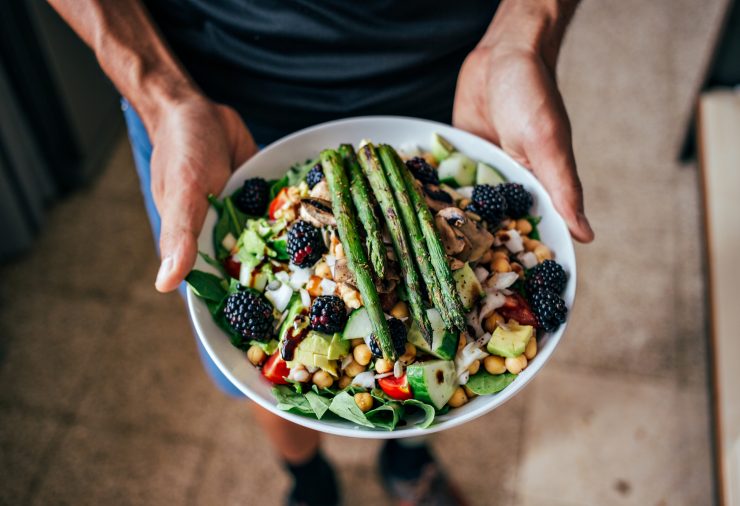- Published by Yvonne O'Halloran
- May 4, 2022
Enough with the palm oil
It’s no secret… palm oil production is destroying our rainforests and lots of vegan food contains it. Whilst a vegan is already making amazing lifestyle choices that benefit people and planet, the philosophy behind veganism is, for most, more than not eating animal products. If you care about the development of a stable food system for all, then we need to end the reign of deforesting natural habitats for staple crop monoculture.
With its versatile properties, palm oil has made its way into chocolate, pastry, pizza, shampoo, toothpaste, household cleaners, animal feed, most store-bought vegan butters and much more. Oil palm is highly efficient in producing large quantities of oil relative to land-use, throughout the year. Oil palm is a major driver of deforestation in some of the world’s most biologically rich ecosystems. Orangutans, pygmy elephants, and Sumatran rhinos are endangered species who are losing their homes to the expansion of this crop.
The vast deforestation in growing countries is contributing to local food insecurity and the destabilisation of valuable ecosystems. Oil palm originated in Africa but was transported to Southeast Asian countries. The commodity is now mainly produced by Malaysia and Indonesia. The tropical climates that grow palm oil, are home to an abundance of unique wildlife that is now under significant threat.
You may have read the term “sustainable palm oil’ when browsing ingredient lists at the supermarket. The reality of sustainable palm is a hot topic of debate, with many considerations still to be made. In 2004, an industry alliance formed referred to as the “Roundtable on sustainable palm oil”. For palm oil to be sustainably certified, the producers must not contribute to further deforestation or conversion of natural habitats. This sounds dreamy, but the progress is running at snails-pace, with claims of violations being carried out on certified plantations, which have been denied by the Roundtable. The expansion of sustainable palm is also made difficult by inefficient tracing of the products through supply chains.
A neglected side of the search for sustainable solutions is the involvement and consideration of the impact on indigenous people in growing countries. To boycott palm oil completely would destroy the livelihoods of millions. A recent study in the Journal of Cleaner Production, highlighted the focus on environmental impacts and the lack of attention given to the socio-economic consequences. The study reported “conflicts and land-grabbing”, with local communities suffering at the hands of palm oil companies.
There is a strong argument for supporting sustainable palm development by buying products that make such a claim, suggesting that it will lead to the correction of the industry over time. WWF show support for sustainable palm, with the argument that merely replacing palm oil with an alternative could cause the same issue. If a less efficient crop is the next favourite, the consequences could indeed be worse. By improving the efficiency of existing oil palm plantations, it is believed that the demand can be met.
However, in 2020, only a 5th of palm oil was deemed sustainable by the Roundtable on Sustainable palm oil, and it hasn’t proved popular amongst consumers. Many consumers are continuing to turn a blind eye to the destruction behind their store-bought products, which means we need to make some noise and show the suppliers that we do in fact care and discuss the topic for those who remain unaware.
Palm oil is a corporate addiction, whilst it is useful, its destruction cannot be deemed necessary as many of its uses are for luxurious food and cosmetic items, rather than contributing to feeding populations adequate and nutritious diets. Despite its wide list of uses, the selection does not seem worth causing food insecurity for growing countries, or decimating the homes of so many animals, plants and fungi. Great consideration must also be given to the livelihoods of those dependent on the palm oil industry, who will be stranded in poverty if given no alternative in the face of industrial decline.
Article written by Aisling Geraghty- United Kingdom
Do you wish to transition to a vegan lifestyle in a safe and supportive environment?
Join V-TRIBE today.Keep Informed
Join our mailing list to receive the free monthly Living Vegan newsletter, as well as two professional Dietitian Resources.

Our Purpose
Co-founded by Accredited Professional Nutritionist and Dietitian Yvonne O’Halloran, LivingVegan.com aims to provide a safe, informative space for anyone wishing to transition to and thrive on a vegan lifestyle. Aside from the proven health benefits, a whole-food plant-based diet has massive positive impacts for the environment and all the creatures we share our planet with. Our goal is to bring you news and resources that will dispel the myths associated with veganism and make the change second nature.
For Health, For Earth, For Compassion…

This section may contain some confronting imagery of cruelty. Cancel, if you don’t wish to view.




